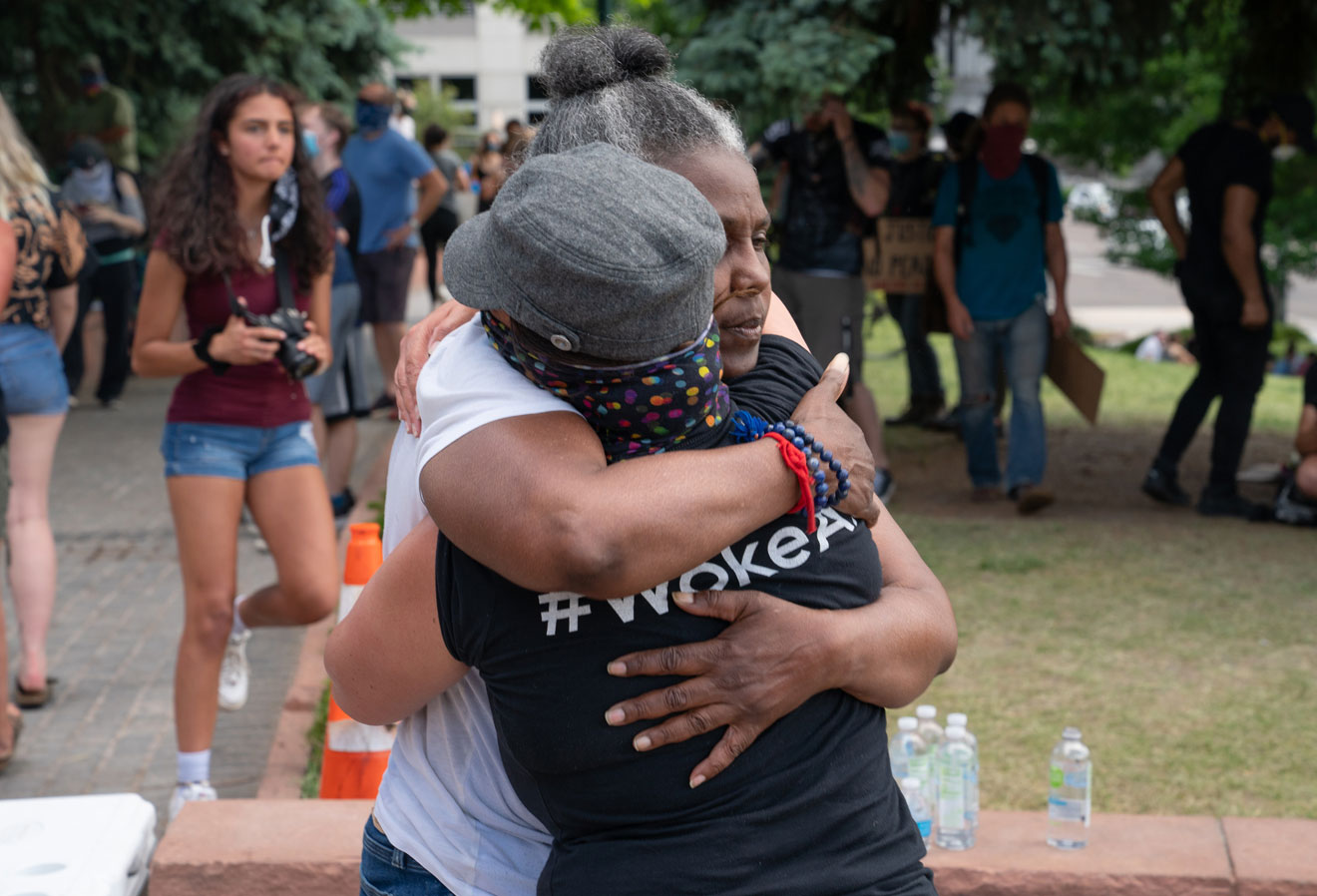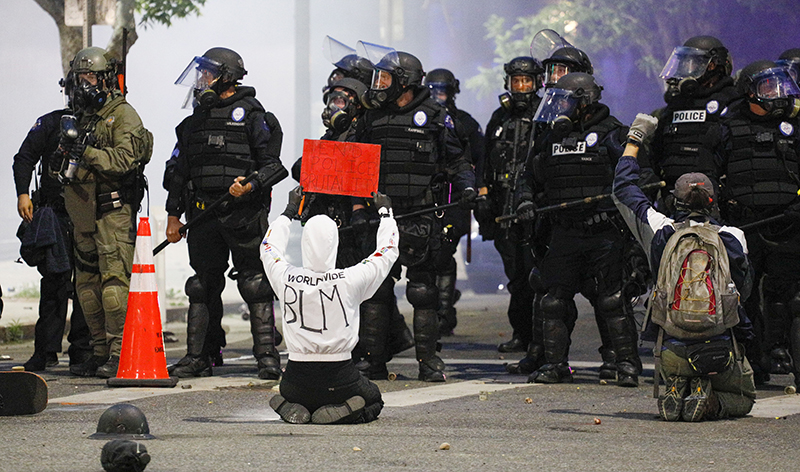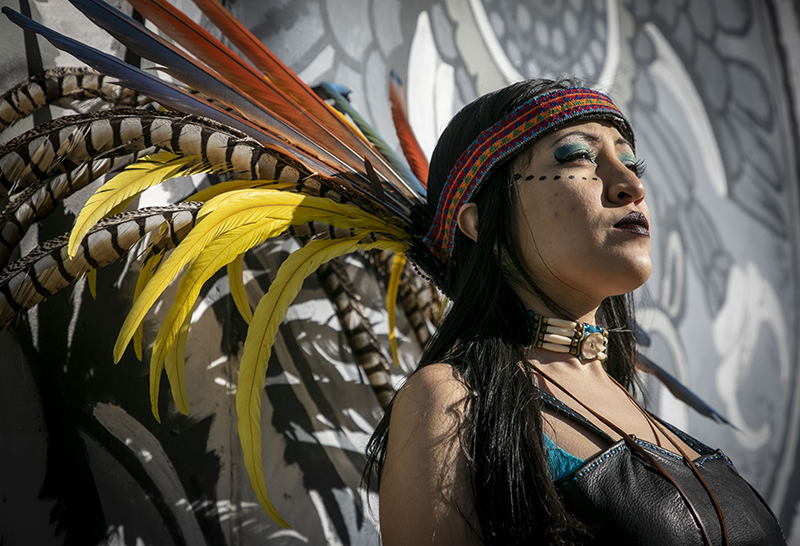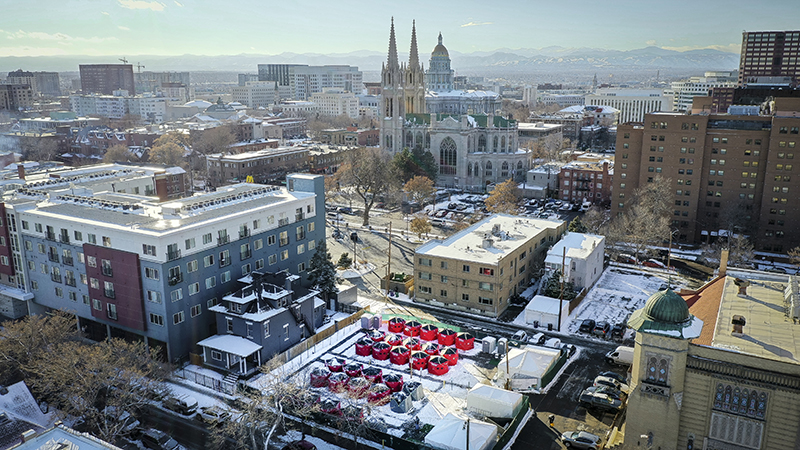
Women hug during a protest in Denver after George Floyd’s death. June 7, 2020. Photo by Steve Peterson
Women hug during a protest in Denver after George Floyd’s death. June 7, 2020. Photo by Steve Peterson
In March 2020, as the coronavirus rounded the corner and sprinted into view here in Colorado, it was already obvious that some communities would be hit harder than others.
In a story published on our website on March 6 of last year, reporter Michael Booth wrote about some of the places that the novel coronavirus might land hardest: on people living in nursing homes, Black communities, people with low incomes. The word “essential worker” hadn’t yet become part of our vernacular, but he wondered about those with “people-oriented service jobs.”
Looking back, the piece comes across as optimistic, if anything.
Today, more than 550,000 people have died of COVID-19 across the country, and more than 6,000 in Colorado alone. Millions are hungry, millions out of work. A generation of children was pulled suddenly from school, their educations disrupted. People are grieving.
And as predicted, the coronavirus has fed on racism, poverty and inequality. Indigenous, Latinx and Black Americans are twice as likely—or more—to have died from COVID-19 than whites, according to national data collected by the Centers for Disease Control and Prevention. More than a third of coronavirus deaths nationwide are tied to long-term care facilities, where research suggests that the low pay and poor working conditions of care providers contributed to the devastation.
As if fearing the coronavirus weren’t enough, Asian Americans also faced an escalation in racist and violent attacks.
There is no silver lining that will bring back the dead.
There are only the lessons that grief brings, the pure light of anger, the ghosts that make demands on us.
When George Floyd was killed in the street by a smirking white police officer, the grief poured outward.

Protesters kneel in front of police in riot gear on a May 31 demonstration in Denver following the death of George Floyd in Minneapolis. Photo by Joe Mahoney via The Colorado Sun
The movement for racial justice that followed in the summer was a movement for life. For all the focus—necessary and blazingly insufficient—on washing hands, wearing a mask, keeping our distance, it wasn’t differences in our individual behaviors that killed more Black than white Americans. It was the weathering of lifelong discrimination, the economic inequities that keep people of color on the front lines, the unequal access to medicine and care. It was racism, in short.
Native and Chicano leaders knew it, too. They learned long ago how a virus can trot alongside colonizers like a vicious dog, doing genocide’s dirty work. And so they took to the streets, demanding that their people be seen.

Indigenous rights advocate Tziavii Stevens, photographed on Feb. 26, 2021, participated in weekly protests at a statue of Christopher Columbus in Pueblo during the summer of 2020. Photo by Joe Mahoney / Special to The Colorado Trust
And there were results. Meaningful reforms to law enforcement in jurisdictions across the country, including in Colorado. New laws to reverse a record of impunity in the murders of Indigenous women.
Advocates in the disability community, who had been crying out for years that too many people lived in institutional care, found systems bending to keep people at home. People who had always known that a tent was safer than a homeless shelter found city leaders finally conceding—at least a little. It happened over and over.

A church parking lot in Denver hosts the Colorado Village Collaborative, a city-sanctioned camp for people experiencing homelessness, photographed on Dec. 15, 2020. Photo by Marc Piscotty / Special to The Colorado Trust
What’s next? A chance to take a breath, maybe. Another crisis after this one, certainly. Gun violence never stopped, and mass shootings have resumed. Climate catastrophe is breathing down our necks.
How well we survive the next crisis will depend on how well we can absorb the lessons of loss: To find a way forward, even when all we want is to go back; to take collective action in the face of collective harm; to listen to the people who have known it all along.
In January 2020, an ethicist named Miguel De La Torre, a professor at the Iliff School of Theology, gave a talk in Denver about hope—specifically, he was against it. He was against hoping that God would sort out racism, injustice and poverty. He was against the facile hope peddled by nonprofits, churches or foundations while promoting our missions or evangelizing to the communities we work in.
What we needed was not hope, said De La Torre, but the desperation known to people who have already lost it all, or never had it.
The year brought lesson after lesson in abandoning hope. People abandoned hope that the virus wouldn’t affect their lives. Parents abandoned hope that they could depend on schools to educate their children. Workers abandoned hope of holding on to their jobs.
People—so many people—abandoned hope that the ones they loved most would survive the year.
What we’ve learned, in a year of desperation, is the power of grief.
Let’s not forget it. It’s a lesson few of us can bear to learn again.